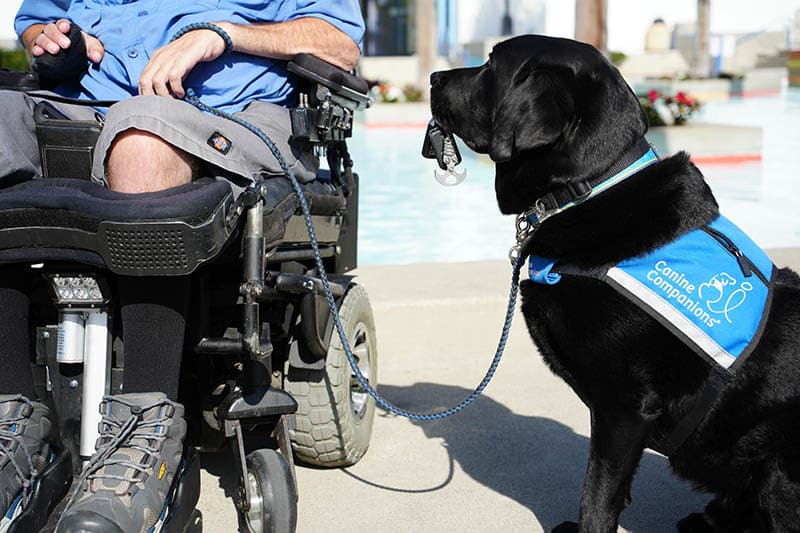 Santa Rosa, California – The immense benefits of task-trained service dogs for people with disabilities are physical, emotional and psychosocial. However, in the past decade, the negative impact of poorly trained service dogs and pet dogs in public places has been rising, limiting service dog users’ ability to fully access those benefits.
Santa Rosa, California – The immense benefits of task-trained service dogs for people with disabilities are physical, emotional and psychosocial. However, in the past decade, the negative impact of poorly trained service dogs and pet dogs in public places has been rising, limiting service dog users’ ability to fully access those benefits.
Canine Companions, the largest provider of service dogs in the U.S., supports public access for service dog users, as one of the organization’s strategic priorities. For years, clients have shared stories and experiences encountering untrained dogs in places where pets aren’t allowed, including altercations that have led to the early retirement of their service dogs.
In 2018, Canine Companions completed their first client survey on the topic of service dog fraud to get a wholistic view of the impact of this important problem. The data collected was clear: poorly trained service dogs and pets in public places have a significant impact on Canine Companions’ clients. In fact, 87% of clients who took the survey encountered these out-of-control dogs in public places. Two-thirds of Canine Companions clients had a poorly trained dog snap at, bite, vocalize at or interfere with their working service dog.
With such a clear impact on Canine Companions clients, the organization expanded its 2019 survey to include service dog users in other Assistance Dogs International* (ADI)-accredited training programs in North America. ADI, the service dog industry’s leading governance and program accreditation body, distributed surveys to over 1,395 service dog users from 41 ADI-accredited programs, and the number of negative impacts were going up.
This year, Canine Companions’ survey went global to investigate the impact of poorly trained service dogs. The 2022 survey was distributed to 60 ADI-accredited organizations across three regions: North America, Europe and Oceania. The 1,503 responses made this the biggest study of the impact of service dog fraud yet.
“We are proud to share the findings of our study in a comprehensive white paper,” says Jeanine Konopelski, vice president marketing and advocacy for Canine Companions. “With growing evidence that poorly trained service dogs and pets are causing serious issues to service dog users across the world, now is the time to take advantage of this new data to make a difference through education of business owners, legislators and the general public.”
Key findings show that:
- 93% of respondents encountered poorly trained or uncontrolled dogs in public during their time as a service dog user.
- 79% of respondents had experienced an uncontrolled or poorly trained dog snapping at, biting, vocalizing, or interfering with their service dog.
- 80% reported feeling that poorly trained dogs had negatively impacted their independence and quality of life.
To Canine Companions, a service dog has always been more than just a vest – bringing expert training, crucial socialization and years of task-based independence to people with disabilities. Now, the results are clear: poorly trained dogs in public being portrayed as trained service dogs are harming those who need help from service dogs the most.
Read the latest findings in Canine Companions’ white paper by clicking here.
*Please be aware that by clicking this link, you are visiting sites that are not managed by Canine Companions. Website security, accessibility and privacy policies may be different than Canine Companions policies. Please read their policies closely.

